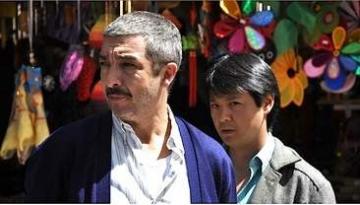`Chinese Take Away': Mutually unintelligible odd couple forms a bond
The chances of being struck by lightning or getting hit by a meteor---or of a cow falling out of an airplane and landing on top of you---are small. But not quite zero.
That's the kind of thing curmudgeonly Roberto ponders, and the kind of stories he clips out of the newspaper, to confirm his pessimistic worldview in "Chinese Take-Away," a bittersweet dramedy of cross-cultural incomprehension from Argentine director Sebastian Borensztein.
It's set in Argentina's Big Apple -- Buenos Aires, not Manhattan -- where grumpy loner Roberto (Ricardo Darin) runs a hardware store inherited from his father. There, he counts every nail or screw in every box that comes in, calling to ream out the distributor if his tally is 245 instead of the 250 as labeled. OCD? De seguro. This is a very precise man, set in his very precise, solitary ways: He speaks few words to few people, treats his customers with disdain and carefully locks the case where he keeps a glass menagerie to rival Laura's, in honor of his late mother. Lights out every night at 23:00 on the dot.
For all his compulsive order, however, Roberto has a whimsical hobby: He collects news stories of bizarre accidents that reflect the meaningless absurdity of life. Such stories reinforce his refusal/inability to relate to people, in general, and to Mari (Muriel Santa Ana), the mailman's sister-in-law, in particular. They once had a passionate encounter, and she has just returned from the boonies with the goal of wooing and winning him more permanently. But Roberto is too diffident and misanthropic for romance.
In any case, his orderly life is suddenly confounded one day when he witnesses a hysterical young Chinese immigrant (Huang Sheng Huang) being thrown out of a taxi. His name is Jun, come to Argentina to find his uncle. He speaks not a word of Spanish but has an address tattooed on his arm. Roberto drives him there, only to discover the uncle sold the place and disappeared years earlier. Roberto takes Jun to the police, then to the Chinese embassy, then to B.A.'s Chinatown -- no luck, no uncle, no choice for Roberto but to shelter the guy for a few days (seven, max!) until the uncle -- or some other way to get rid of him -- materializes.
"Chinese Take-Away" (the British-oriented title would be better translated "Take Out" for Americans) features a stunning pre-credits sequence in China, based on that proverbial cow falling from the sky. Is there an explanation for such an absurd thing? Roberto's and Jun's backstories will come, in due course, with the help of a Chinese-food delivery boy.
Writer-director Borensztein's story takes its time unfolding, but his editing is crisp, and his mix of comedy and drama feels right. The heroes' awkward domestic moments include some very funny breakfast and dinner table scenes, and one fine set piece when the wrong uncle (and wrong nephew) are reunited, to the chagrin of all. We also savor Roberto's mental re-creations of those bizarre news clippings, starring himself.
Mostly, we savor the fine performances, especially Mr. Darin's Walter Matthau-esque grouch -- a tough cookie, who doesn't suffer fools. He head-butts a rude cop and takes on the whole Chinese embassy, but he's got a heart of at least silver or bronze, if not gold, to admit this hapless alien into his home. Mr. Darin (aka "the Argentine equivalent of Robert De Niro"!) is a versatile veteran best known to Yankees for his masterful detective portrayal in Juan Jose Campanella's "El Secreto de Sus Ojos" (The Secret in Their Eyes), the terrific Oscar-winning best foreign film of 2010.
Here, Mr. Darin's odd-couple pairing with Mr. Huang works well and their problematic, wordless relationship deepens with the catalyst of Mari. "It's hard for me to deal with certain things," Roberto confesses to her. "I know," she replies. "That's why you don't give me a chance, either -- and I speak Spanish."
If the eventual backstory revelations are a bit too ingenuous (involving Argentina's 1982 "Malvinas War" with England), the warm-hearted message -- that language needn't be a barrier -- is not. What we have here is a glorious failure to communicate. With a delightful Hitchcockian score by Lucio Godoy.
Mr. Darin's dour Roberto, with his nobility and pain and bursts of comic violence, is matched by Mr. Huang's Jun -- so cluelessly polite and long-suffering. I like the fact that there are no subtitles when he speaks. We apprehend only as much (usually as little) as frustrated Roberto does. Give Mr. Huang lots of credit for hooking us on his semi-stereotyped Chinese character, without our understanding anything he says.
It's the egg role of a lifetime.
(In Spanish and Mandarin, with English subtitles.)






